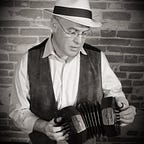Rinse. Repeat. Music As A Lifestyle
In his book Outliers, Malcom Gladwell writes how expertise and success are achieved using the “10,000-hour rule”, immersing oneself in their craft and area of study for at least 10,000 hours. While much has been written and said in either support of or to debunk this theory, I pretty much took it as hyperbole to mean…a lot. Any musician will tell the real answer to musical success is the one to the old joke,
‘how do I get to Carnegie Hall?
Practice’.
I bought my first English Concertina to use in the development of a musical acrobatic circus act (that’s another story). It is a complicated instrument with a button system corresponding to a particular musical note alternating on each side of the instrument. It takes some getting used to and the only way to do that is sit down and play it. And play it. And play it. So that is what I did. I can easily state I exceeded the 10,000 hour mark but its better say I practiced and played…a lot. Night and day. 7 days a week.
Already having an extensive musical background, I was fortunate to meet and be taught and mentored by the famed Matueswitch Brothers, Boris and Sergei. Boris was a masterful musician and a world renown classical English Concertina player. He passed away in the mid-70s after which I studied and concertized with his brother Sergei, also an accomplished classical piano accordion and EC player as well. They both planned out my weekly lessons that grew increasingly challenging, quickly improving my skills as a player but also gave me the self-sufficiency and musical knowledge to arrange for the EC to play solo for an audience. Once I developed a small but consistent repertoire, I began playing for whoever would listen. My days were as follows: I spent the mornings drinking coffee and practicing. By 11:30 AM I would setup somewhere in Manhattan and start playing for whatever audience was passing by on the street until the lunch crowds thinned. I would go back to my Brooklyn apartment and practice some more. In the evenings I would play in cafes and restaurants in Little Italy on Mulberry Street where I would pass a hat or plate.
This became a daily routine. Rinse. Repeat.
Most concertina players in my world were folk musicians playing traditional Irish, English, or Scottish music. I loved the Monday night Irish Jam at Eagle Tavern on the far lower West side. But I was finding that playing French, Italian, and American standards not only rewarding musically, honing my craft, but having some financial benefit as well. I wanted to become a full-time working musician.
I joined the musician’s union. I invested in promotional material and signed up with agencies that booked variety entertainment. I sent mailings to music contractors and recording studios. I sat and waited for the phone to ring.
Rinse. Repeat.
Even though my repertoire was growing, and I was performing some, it was not happening as quickly I as wanted. So, I picked up my case, a pocket full of business cards and started walking around Manhattan to every French and Italian restaurant in the upper east side, lower west side, uptown and downtown. I offered to play for free a short set just to see if they liked it. Some did and would hire me to play for a brunch or a weekday evening. I eventually landed a paid four-night spot in an Italian restaurant. They liked me, my music, and I did not block the cramped aisles like the accordion player they had previously.
As there was no social media back then to advertise my gig, I sent post cards and flyers to everyone one I knew: every agent, friend, musical contractor and restaurant I previously visited. Soon I was booked Sunday brunch at Tavern On The Green in Central Park, getting calls for recording studio work, and contracted to perform as a musician onstage in a Broadway show.
Rinse. Repeat.
The music business is fickled. Every gig eventually comes to end. One can never rest on their laurels. That check doesn’t cash. While I had some great successes there were also times of fewer musical opportunities and short resources. Yet somehow that never seemed to dissuade me. I still woke in anticipation for practicing and playing. And that next gig. If I could not get hired to play somewhere, I could always just sit, open my case and play for the pure enjoyment of playing my music.
It is years later but I still practice and play my music. A lot. While I do not dispute Gladwell’s 10,000 hour premise, I think my musical sentiment is better epitomized by Duke Ellington when he states in his book Music Is My Mistress:
“Lovers have come and gone but only my mistress stays.”
Randy Stein
March 2, 2021
